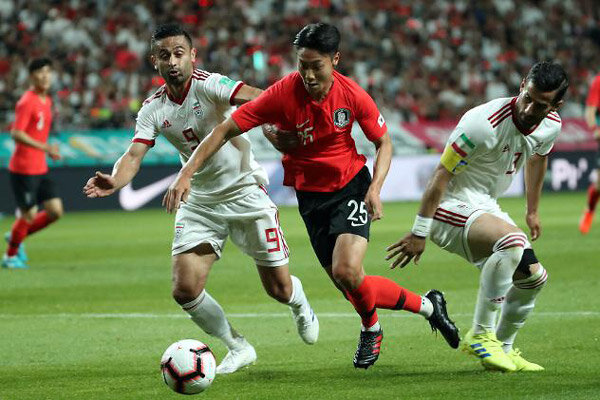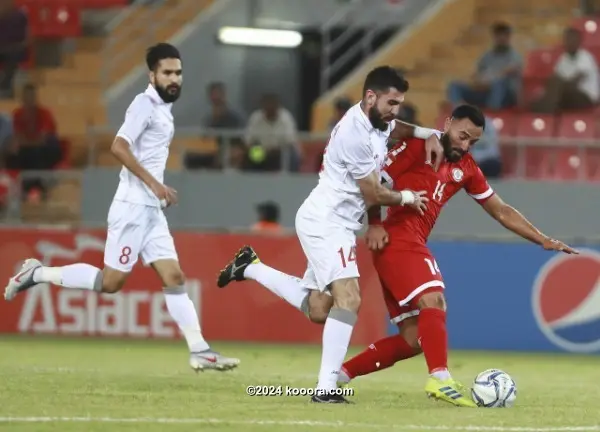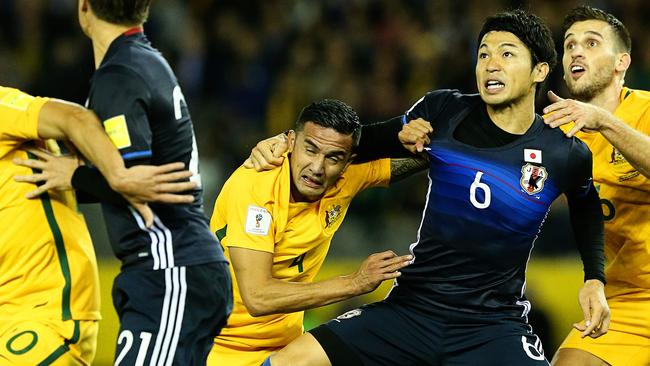A short preview on the 2022 FIFA World Cup qualification third round in Asia – Matchday 4
Matchday 4 for any Asian football lovers will be a matchday to get addict with. It's not hard to realise there will be a major festival for football watchers, where major games will place teams in a serious gamble for wins or the losers take all.
Group A
United Arab Emirates vs Iraq
Gaining only two points out of three games, both the UAE and Iraq are under tremendous pressures to gain a win to restart their already struggling campaigns, hence the upcoming 12 October face up is going to be a square off in Dubai's Zabeel Stadium. The UAE and Iraq are no stranger as they share common culture, language and has also squeezed off several times in major competitions, not to say even common managerial philosophy.
The UAE, led by Dutchman Bert van Marwijk, has been unable to produce the same performance it did in the second round comeback, getting with only a goal scored by none other than Ali Mabkhout. The UAE's resistance to Iran was a bright point, as the Emiratis succumbed to only an one-nil defeat, but this loss drastically put its attacking ability into a serious question. The lack of a competitive, cohesive organisation and coordination between players from three lines have been blamed for the UAE's ineffectiveness. Van Marwijk, already fired back in 2019, understands that he will no longer be the team's coach if he can't end the UAE's World Cup drought that began since its only participation in 1990.
Yet Iraq isn't better, with the only bright point was holding the South Koreans goalless in Seoul, before getting taken down to earth by Iran and Lebanon, scoring none. Coincidentally, Iraq is also led by no other than recently-departed Feyenoord manager Dick Advocaat, which van Marwijk claimed the UEFA Cup for her in 2002. Because of the same nationality, Advocaat must have been aware about van Marwijk's tactical line-up, thus the Dutchman has promised a complete overhaul to rescue the fortunes that Iraq lacks after going without a goal for more than 300 minutes. Yet again, injury is also a menacing problem for Iraq: the Iraqis have lost key men like Jalal Hassan and Mohanad Ali, seen as an instrumental parts of a reviving Iraqi side. With the lack of these players, Iraq will have to find the way to break the UAE if it wants to end its World Cup drought since the country's only participation back in 1986. Innovative is a must goal for the Iraqis.
Ali Mabkhout remains the hosts' biggest hope, having put up a fine showup against Iran and remains the UAE's sole scorer in this third round. Aymen Hussein, meanwhile, with his credible 1.9m height, is seen to be the key man for Iraq in air combat against the Emirati defence.
Iran vs South Korea
In the group A, Iran and South Korea are the two brightest national teams from the group, and they have shown somehow that it is not just for fun. Indeed, the upcoming fixture between Iran and South Korea, held in the Iranian capital Tehran, will decide who shall dominate. Iran is holding an undefeated streak to South Korea since 2011, though fans will not be allowed to enter due to pandemic concerns.
After a somewhat sluggish showup in the second round, Iran has succeeded in reclaiming its title as the biggest powerhouse in Asia, much to the shock of pundits, in just two months. Successfully trashing neighbouring rivals Iraq and the UAE, coupled with a hard-fought home win over Syria, cemented Iran's position and has generated greater optimism among Iranians about the country's third consecutive World Cup appearance streak (and six overall). Although questionable, Croatian manager Dragan Skočić has turned the table around by successfully injecting a new group of fresh blood working alongside the experienced players in Europe. Still, the biggest achievement of the Croatian is reviving the disciplined performance of Carlos Queiroz, former Iran's manager from 2011-2019; this is best seen when under his command, Iran conceded only two, consolidating Iran's first place.
Meanwhile, South Korea has yet to show the same insignia, trailing behind Iran with two points. However, the Koreans have, at least, obtained necessary wins against Lebanon and Syria to occupy second place, which will qualify them for Qatar automatically. Attack remains an unsettled issue for former Portugal boss Paulo Bento, when South Korean players have not provided better quality in these meetings. Nothing is better than seeing the way South Korea failed to find the way to the net of Iraq, despite enjoying 75% possessions and nearly 20 attempts. However, the match against Iran promises to be a different test due to the quality of Iranian players far superior to that of the three previous Arab opponents. It requires a strict Korean defence if South Korea ever wishes to gain at least a point like how it did in there back in 2009.
Mehdi Taremi is the most recent scorer on Iran's 1-0 win away over the UAE, equalised the record with captain Alireza Jahanbakhsh and gave Iran an unthinkable advantage due to the strong performance of Iranian strikers. On the other hand, Son Heung-min's late goal against Syria saw Tottenham's midfielder and South Korea's icon scoring his just fourth goal in the qualification.
Syria vs Lebanon
By looking historical head-to-head, Syria is totally dominant toward Lebanon with 14 wins compared to Lebanon's 4. Yet Syria has never managed to beat Lebanon since 2013, with Syria getting two losses and a draw, the most recent fixture was a humiliating 1-2 loss in the regional WAFF Championship. Such a prolonged winless streak prompted the Syrians to be seriously if it wants to bid for a historic appearance in the FIFA World Cup.
Said is easier than done, however. In spite of brave performance against South Korea, the Syrians still lost by a late courtesy, and is now bottom-placed with only a point. Nizar Mahrous has made his name for making Syria somewhat a capable opponent, yet to overturn against an opponent 20 times smaller than his country will require the Syrians to be calm. Syria does have the deeds in favour, with the Syrian side composing more talented players than that of its neighbour.
On the other hand, goal-hungry Lebanon has stunned predictions with a brave holding 0-0 against former Asian champions Iraq to acquire two points, sitting fourth behind the UAE. Czech manager Ivan Hašek, a defender back in his only World Cup at 1990, was able to nurture and strengthen the Lebanese defence into a solid organisation, the one that frustrated South Korea in Lebanon's agonising 0-1 away loss. The same defence that Syria has been unable to break since 2013, the Lebanese are likely to bring up the method to put a fight against a determined but lacklustre Syrian side on its bid to qualify for the first-ever FIFA World Cup.
The 84' goal of Omar Kharbin was his first-ever goal in this qualification cycle, a reward for the 2017 winner of the Asian Player of the Year - and he would love to bring the same energy to break the Lebanese wall. Meanwhile, Robert Melki has also made a name for himself as being a solid defender standing in front of his team's net, contributing to Lebanon's successful goalless draws over the UAE and Iraq.
Group B
Saudi Arabia vs China
Historical record between Saudi Arabia and China indicated a fairly contested encounter when the Saudis trailed behind China by a win. Nonetheless, Saudi Arabia has been more prestigious when it comes against China, the record of World Cup participation and Asian Cup titles fairly support the Saudis, as Saudi Arabia claimed three Asian Cup titles and played in five World Cup, compared to China's just one. Yet the most recent meeting was a win for the Chinese, a 2015 Asian Cup group stage match where China won 1-0.
Saudi Arabia, however, has more reasons to be happy. A 1-0 home win over powerhouse Japan extended Saudi Arabia's winning streak to nine, and the country itself has started to dream about the 2022 FIFA World Cup held in neighbouring Qatar. Former Morocco's boss Hervé Renard, hailed as the architect on Zambia's 2012 AFCON conquest and Morocco's return to the World Cup after 20 years absent, is riding high as the Saudis will stay home to face the Chinese. The same Jeddah's King Abdullah Sports City, a witness of Saudi Arabia's twice celebrations against Japan, is likely to be the build-up base for Saudi Arabia's successful bid to Qatar.
Saudi Arabia's reasons to celebrate is even greater when seeing China's lacklustre 3-2 win over Vietnam, where the Chinese conceded two goals in just ten minutes of the second half. China's open reliant on Wu Lei gave China a hard-fought victory and first three points, but Team Dragons is unlikely to get luck against the Saudis, whose squad is far stronger and younger than that of China. Indeed, with the Chinese squad's average age, it is not hard to imagine Li Tie's frustrating expression after China's struggling win. Not just that, a great lack in combination and coordination between players of the Team Dragons have also contributed to China's inability to hold up the scoreline, even in China's struggling 3-2 win.
Saudi Arabia's Firas Al-Buraikan has been the sole scorer in Saudi Arabia's another 1-0 triumph over Japan, as the 21 years old is expected to bring more hardship to the fragile defence China is having. Espanyol's marksman Wu Lei, who scored twice in the previous encounter, is likely to be China's only hope in the journey seen to be more tricky.
Japan vs Australia
Japan is Asia's most prestige and has been the biggest powerhouse since transformation to professional football in 1993. On the other hand, Australia was quick to establish foothold in Asia since joining the AFC in 2006. However, Australia and Japan have a long history of meeting, with Japan currently holding an unbeaten streak to the Socceroos since 2009. Japan's squad is also composing better players, while Australia's counterparts are now languishing in medium-tier UEFA members.
But saying like this means it will not spend times talking about the current campaign of Japan has been far more dismal than expected. A shock home loss to Oman was followed by a blowing defeat to Saudi Arabia, both 0-1, to put Japan in fourth place due to inferior H2H to Oman. It's astonishing to see Japan currently demonstrates an unimpressive form, much of the blames lay on the lack of coordination between forwards and defenders, as well as the unorthodox line-up of Hajime Moriyasu, who is facing a potential sacking if Japan can't beat Australia. Another reason is the Blue Samurai's injury storm attacking the Japanese, with Takumi Minamino and Kyogo Furuhashi, two of Japan's most promising new young stars, are fractured with injuries and unable to play for 90'. Whatever it said, if Japan can't win against Australia, Moriyasu's coaching position will surely meet his fatal end.
Graham Arnold is aware about this fact, and even more about the undefeated streak Japan is enjoying against Australia, so Arnold is clear that only a win in Saitama will provide morale. Socceroos is having a victorious streak of 11 games in a WCQ, the first national team to do so. But traveling to Japan is never easy and this fixture is likely to be the same. But Japan's poor showup is Australia's gain: the lack of Australian players in the bigger leagues today outside the likes of Ajdin Hrustic and Mathew Ryan makes Australia more unpredictable and more teamwork mentality, which didn't exist in the previous Socceroos' Golden Generation. The way how Arnold, a student of Guus Hiddink in Australia's 2006 WC, turns the Socceroos around has been worth appreciating by pundits, though scepticism remains deep and high among its supporters. The most disappointing is the lack of home experience, something Australia will correct in November.
While Japan's biggest strength lies on the midfield control, it's the defence that needs to be fixed, thus Takehiro Tomiyasu, who had a bright form in Japan's agonising loss to Saudi Arabia, is expected to be the wall of Japan's shaky defence. Australia's Awer Mabil has gone riots with two goals in the qualification as the opener on Australia's wins over China and Oman, both in Doha.
Oman vs Vietnam
Oman and Vietnam have just faced each other twice, back in the 2004 AFC Asian Cup qualification cycle. Oman was victorious in all of them with a 8-0 aggregate, and is likely to extend the streak again as Vietnam remains the only AFC team to not gain a single point in the qualification's last round. Coincidentally, this will be the rematch of two managers of both side after 19 years, when they were coaches of South Korea and Iran Olympic sides in the semi-finals of 2002 Asian Games.
The current form of Oman after three games is described as too good for an underdog as they caused hardship on three giants, Australia, Saudi Arabia and Japan, including a historic win against the latter. Though flattened by the Aussies 1-3 in Doha, one can't reject the fact that Branko Ivanković was an incredible manager who was able to throw a new wave on the national side. This will help by the very powerful home advantage that Oman will enjoy in October, even when the weather is milder than the hot June. Omanis are renowned to be passionate football lovers, and the current third-place occupation, which guaranteed a playoff spot, is surely rewarded.
On the other hand, Park Hang-seo's young Vietnam side is still looking the first point, after Vietnam suffered an agonising 2-3 defeat to China due to an injury time goal by Wu Lei to put its losing streak to four. The injuries ravaging Vietnam have shown some signs of cooling down, but problems remain as Vietnam's ineffective defence weakens greatly the Vietnamese prospect. The debutant doesn't want to end up seeing only miseries though, but a win against Oman away seems to be an impossible job, given Southeast Asian teams have never managed to beat Oman in Omani soil.
Arshad Al-Alawi added into the list as one of only two Omanis to score in Oman's campaign so far. Meanwhile, Vietnam's Nguyễn Tiến Linh has gotten his mark with a goal in this stage.






Comments
Post a Comment